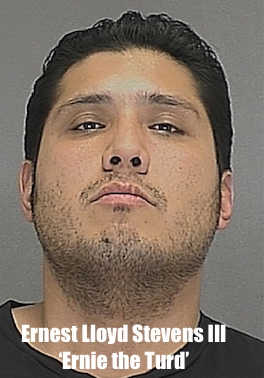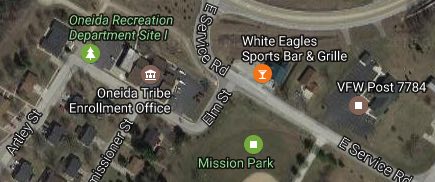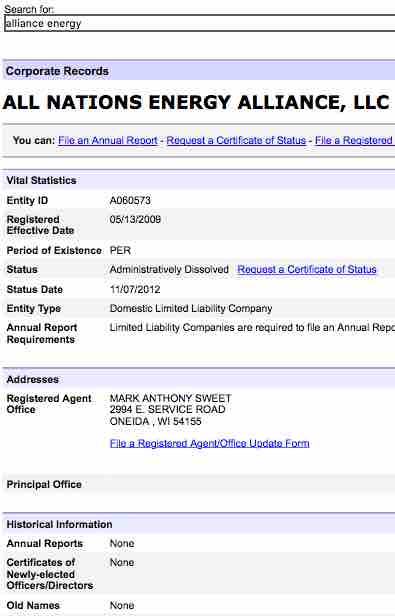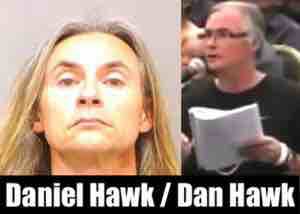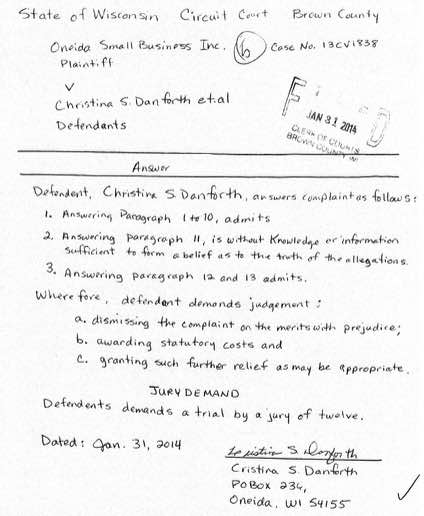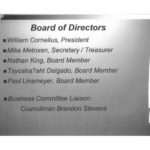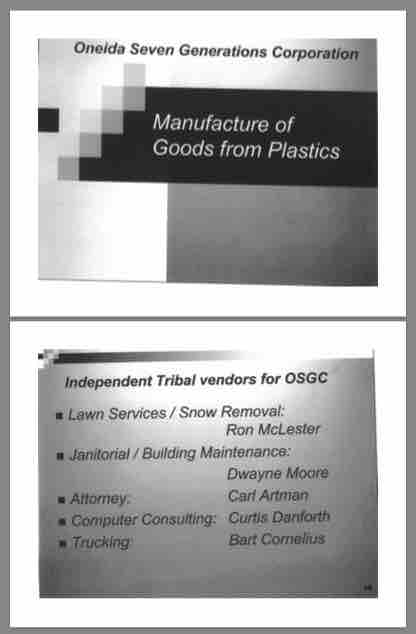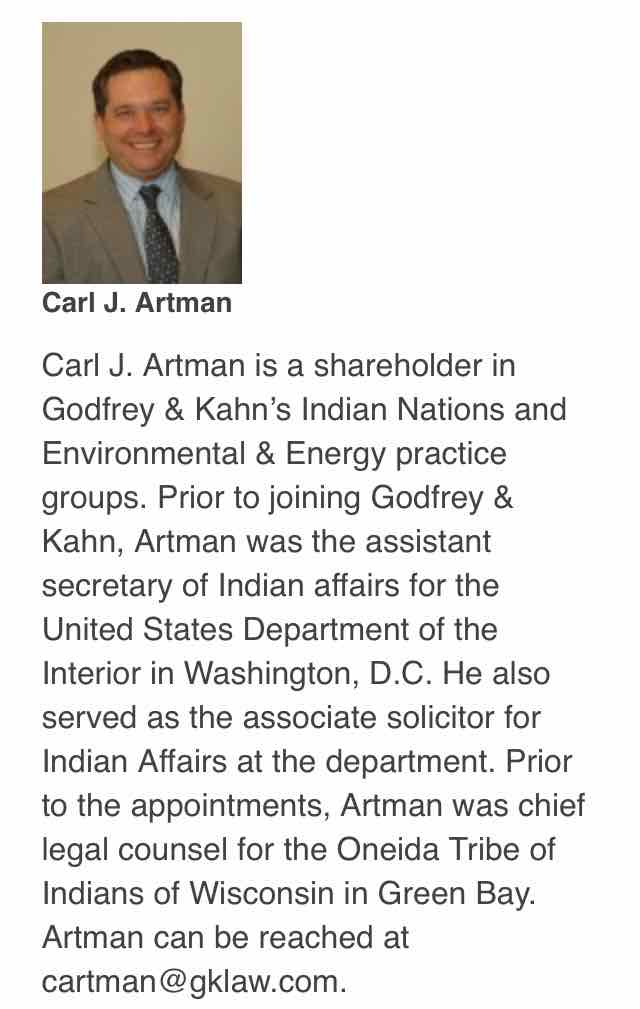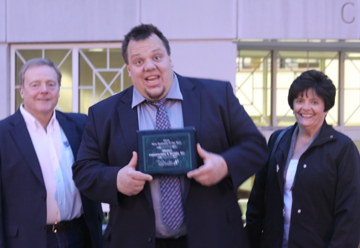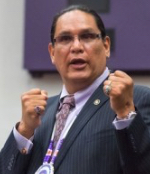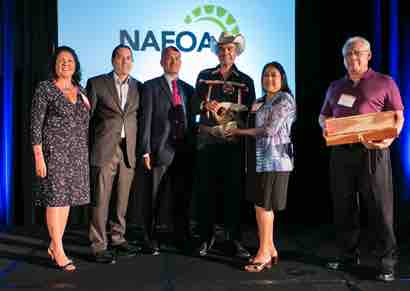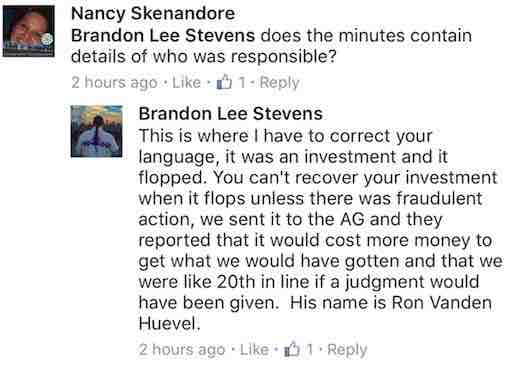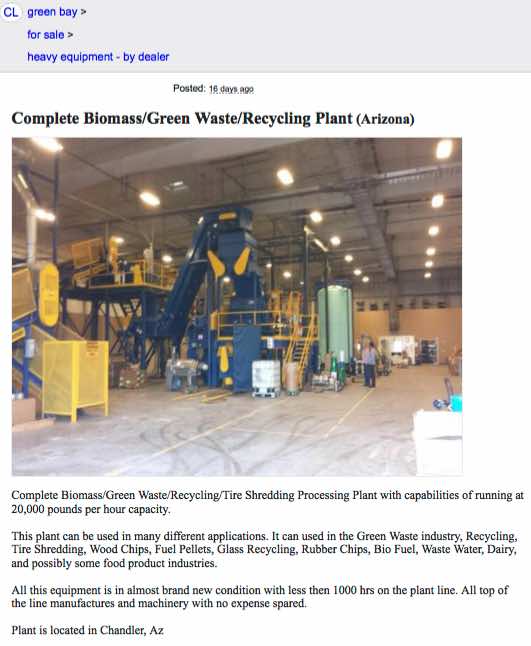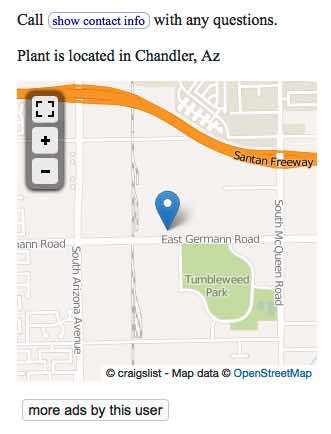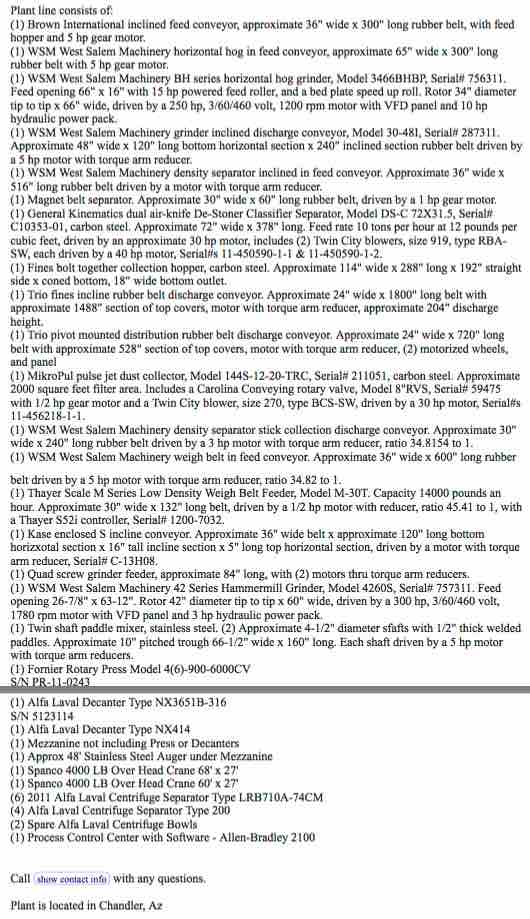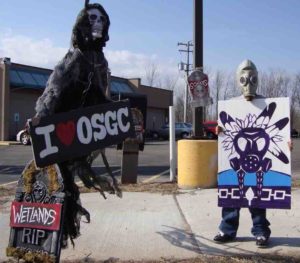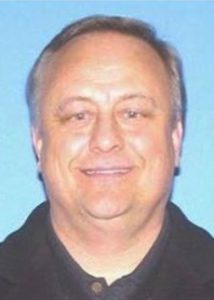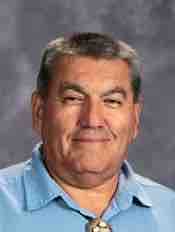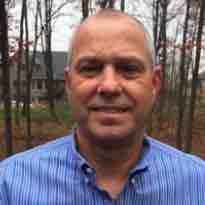
IGNORANT CORRUPTION
KNOWS NO BOUNDARIES
• JULY 17, 2017 ONWI GENERAL TRIBAL COUNCIL MEETING:
Despite the asinine insinuations of OSGC’s current ‘Managing Agent’
Pete King III in the July 17, 2017 GTC Meeting video excerpt above, ONEIDA EYE HAS NOT received ANY funding from the Village of Hobart, Wisconsin nor from any other group.
INSTEAD, about $1,000 has been kindly donated over the course of FOUR years by FIVE enrolled ONWI members… plus $40 from just one non-ONWI member.
Our TWO WRITERS/EDITORS – including ONEIDA EYE’s PUBLISHER – have personally spent 1,000’s of hours of work & more than $5,000 in website costs ($150/year) & court document costs (which range from 10¢ to $1.25 per page) as well as audio & videos of ONWI meetings ($3 each), all available to our readers for FREE on our Documents Page with about 100 posted so far JUST IN 2017 ALONE…
plus travel costs when records are only available in other counties & states and when the OBC & Oneida Law Office refuse to provide timely copies of important court filings – not to mention forgoing paid work hours & spending vacation time attending various meetings & court hearings in person.
In other words:
WE’VE PUT OUR OWN ASSETS on the
LINE EVERY DAY for FOUR YEARS
to DEFEND GTC & the General Public
from CORRUPT LYING CROOKS…
…making the kind of personal sacrifices that Pete King III would know ABSOLUTELY NOTHING about.
For our generous efforts we’ve been threatened with lawsuits by scam artists, unjustly detained & falsely charged with ‘obstruction’ by Oneida Police Department ignoramus #1832 Nathan L. Ness (whose vindictive citation was rejected by the Outagamie County Court), and endured public threats on Facebook by belligerant imbeciles like incoming OBC Member Ernie Stevens III…
 …the halfwit half-brother of incoming OBC Vice-Chair Brandon Yellowbird Stevens and the nephew of incoming OBC Chair Tehassi Ron Hill Jr., each of whom will be sworn into office on Thursday August 10, 2017.
…the halfwit half-brother of incoming OBC Vice-Chair Brandon Yellowbird Stevens and the nephew of incoming OBC Chair Tehassi Ron Hill Jr., each of whom will be sworn into office on Thursday August 10, 2017.
Ernie Stevens III – who is the birth son of National Indian Gaming Association / NIGA Chair & Spokesperson Ernie Stevens Jr. (first-cousin of Oneida Eye’s Publisher) – openly stated on Facebook while he was formerly employed as an ONWI Communications Specialist:
When we find out who the admins and authors of this site, they should be disenrolled and banned from the reservation for life. For their own good.
At the time he made that threat on Facebook holding a weapon, Ernest Stevens III was on a deferred prosecution program for Domestic Violence.
Ernie Stevens III was later made Director Native American Tourism of Wisconsin [NATOW].
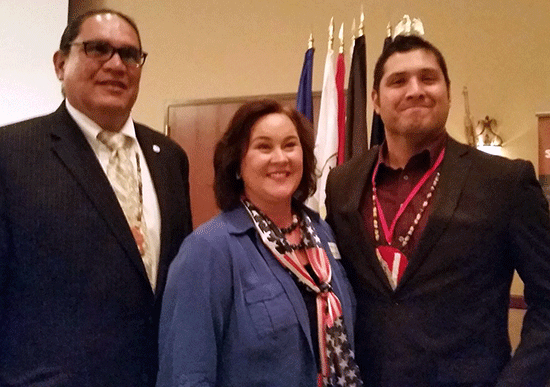
National Indian Gaming Association/NIGA Chair Ernie Stevens Jr., WI Dept. of Tourism Sec. Stephanie Klett, and Crooked Ernie the Turd
There is no plan to monetize Oneida Eye with advertising (as was suggested to us by the principals of the sketchy Oneida Small Business, Inc. when they strangely contacted us out of the blue in 2014 and offered to give us a large business loan), but we appreciate the small gifts we’ve received to offset considerable document and travel costs.
Thank you for reading & sharing.
ON JUNE 28, 2017
ONEIDA SEVEN GENERATIONS CORP.
& OSGC’s DELAWARE-REGISTERED
SUBSIDIARY / FAÇADE / ALTER-EGO
GREEN BAY RENEWABLE ENERGY, LLC
APPEALED U.S. DISTRICT COURT for
EAST. WI’s JUNE 6, 2017 DISMISSAL
of ONEIDA BUSINESS COMMITTEE–
FUNDED & GODFREY & KAHN S.C.–
HELMED MALICIOUS PROSECUTION
AGAINST THE CITY OF GREEN BAY
DEFENDING OSGC’s & GBRE’s
OBC-FUNDED, -AIDED & -ABETTED
CRIMINAL FRAUD SCHEMES:
• June 28, 2017 Court Documents
for the 7th Circuit Court of Appeals,
Oneida Seven Generations Corp. / OSGC & subsidiary Green Bay Renewable Energy, LLC / GBRE v. City of Green Bay
FOX 11 WLUK :
• Oneida Seven Generations Corp.
ALSO…
USA Today/Green Bay Press Gazette:
• Wisconsin Oneidas challenge New York Oneidas’ exclusive right to use trademarked names
…after voting to change the official name from ‘Oneida Tribe of Indians of Wisconsin’ to something they were warned & knew beforehand would infringe on two other native nations.
Oneida Seven Generations Corp.
The TIMELINE contains NEW INFORMATION, such as…
• Oneida Recycling Solutions, LLC
• Broadway Manufacturing, LLC, and
Italicized notes at the end of the Memo state
the “biomass pyrolysis device”
was being sold to OSGC by…
…and the notes said that the seller of the biomass pyrolysis device was in delinquent status with WDFI as of 04/04/11.
HOWEVER . . .
Oneida Eye believes “Alliance Energy Alliance, LLC” is a typo and was actually in reference to a company that the Oneida Nation of WI’s General Tribal Council was never informed even existed –
– which was registered w/ WDFI on 05/13/09 and delinquent as of 04/01/11; Registered Agent Mark Anthony Sweet; Principal Office:
2994 E. Service Road, Oneida, WI, 54155.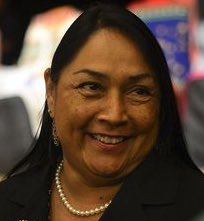
MEANING THAT COMPANY SHARES
THE EXACT SAME ADDRESS AS
ONEIDA BUSINESS COMMITTEE
CHAIR & FORMER OBC TREASURER
CRISTINA DANFORTH’s
OWN PERSONAL FAMILY BUSINESS
. . .
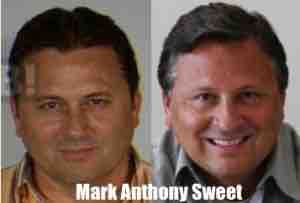
MARK ANTHONY SWEET is also the listed as being the Manager of…
ALL NATIONS DEVELOPMENT ALLIANCE, LLC
registered w/ Minnesota Secretary of State on 04/04/10;
Registered Office: 7241 Ohms Ln. #275, Edina, MN, 55439; Principal Office: 350 N. Main Street, Suite 236, Stillwater, MN, 55082.
THINK
ABOUT THAT
OBC & OSGC tried
to convince the ONWI
General Tribal Council
to borrow millions in loans
to buy a ‘machine’ from
a company located in
a rez bar owned by
Cristina Danforth
(fmr. OBC Treasurer,
exiting OBC Chair)
whose sister
Caterina ‘Cathy’ Delgado
was on
OSGC’s
Board of Directors
which the OBC ‘oversees.’
Cristina Danforth obtained & defaulted in bankruptcy on loans against her drinking establishment …
(and secret energy company headquarters) from…
According to court documents in Brown County Case No. 2013CV1838, Oneida Small Business, Inc. v. White Eagle Sports Bar & Grill, LLC, Paul Danforth, and Cristina Danforth:
On November 18, 2009, Defendant, White Eagle Sports Bar & Grill, LLC, delivered to Plaintiff a Business Note for consideration. The Note was in the sum of $48,925.16. On August 18, 2006, Defendants, White Eagle Sports Bar & Grill, LLC, Cristina Danforth and Paul Danforth, signed a General Business Security Agreement pledging assets of the LLC as collateral on the Business Note and on August 18, 2006, Defendant, Cristina Danforth, married to Paul Danforth at the time, signed a Continuing Guaranty (Unlimited), personally guaranteeing the loans of White Eagle Sports Bar & Grill, LLC.
…As of November 13, 2013, the date of Plaintiff’s Summons and Complaint, there is owed the sum of $54,358.80, comprised of principal, accrued interest and late charges. Interest against the principal accrues at 4.0% interest.
…Cristina Danforth, in her Answer to the Summons and Complaint in this case, did not deny she was in default on the note.
As a result of the defaults in payment, Plaintiff, as it is entitled to do under the note, has declared the indebtedness immediately due and payable and demands payment in full and surrender of the business assets which secures repayment of the indebtedness.
…In her answer, Defendant, Cristina Danforth, failed to state any valid counter claim or defense relating to her failure to make payments on the note as they became due.
Excerpt from Defendant Tina Danforth’s handwritten Answer (with her own name misspelled TWICE):
Defendents [sic] demands
a trial by a jury of twelve.
[We have a feeling she’ll get at least one.]
AND YET . . . BEAR WITNESS to the
ASTOUNDING COGNITIVE DISSONANCE
of OBC CHAIR CRISTINA DANFORTH’s
HEAD CHEERLEADER & CAMPAIGNER,
ONEIDA TIMES PUBLISHER
YVONNE METIVIER,
as TINA CONTINUES DEFENDING
‘GREEN ENERGY’ FRAUD SCHEMES
at the JULY 17, 2017 ONWI
GTC SEMI-ANNUAL MEETING:
What remains unclear are the connections
that ALL NATIONS ENERGY ALLIANCE, LLC
and ALL NATIONS DEVELOPMENT ALLIANCE, LLC
have to the company most publicly associated with
OSGC’s ‘PLASTICS-TO-OIL’ FRAUD SCHEME…
CARL J. ARTMAN – OSGC’s Attorney and GODFREY & KAHN Shareholder; Fmr. ONWI Law Office Chief Counsel; Fmr. Asst. Sec. for USDOI Indian Affairs; LOST the Oneida Nation of WI over $95 MILLION on AIRADIGM COMMUNICATIONS…
PLUS who knows how many TENS of MILLIONS MORE on OSGC’s waste-of-energy FRAUD SCHEMES.
The new Alliance Construction and Design, Inc. was registered w/ WDFI on 07/16/2009, w/ changes of Registered Agent on 09/27/11, and on 09/20/16 to Todd Parczick [seated middle].
The original ‘Alliance Construction and Design, LLC’ registered on 03/31/09 w/ WDFI was renamed Alliance GC, LLC on 07/16/09 [GC = ‘Global Conservation’], w/ changes of Registered Agent on 05/05/11, and 04/10/12, and 03/25/15 to Todd Parczick, who is also a principal of ‘plastics-to-oil’ company…
...for which the Registered Agent is Mark Verhaagh [seated right].
P2O Technologies, LLC was registered w/ WDFI on 06/12/2012 and Dissolved on 6/09/2015.
According to the Ashwaubenon Press, ‘Village Learns of Bio-Mass Plant on Packerland’
[Village President Mike] Aubinger asked if there was another plant somewhere that the Village could look at. [Todd] Parczick said no, this is the first plant of its kind in the United States.
ALLIANCE CONSTRUCTION & DESIGN, LLC MEMBERSHIPS and PARTNERSHIPS LIST posted on the company’s website lists the following companies involved in OSGC’s & GBRE’s ‘Waste-to-Energy’ / ‘Plastics-to-Oil’ schemes:
Partnerships:
• Oneida-Kodiak –
www.Oneida-Kodiak.com
[owned 51% by OSGC & 49% by Alliance Construction & Design]
• NewWay Global Energy –
www.NewWayGlobal.net/thenewway
[Wolf Creek Holdings / David J. Wolf, New Way Energy Inc.]• Alliance Global Conservation
www.AllianceGlobalConservations.com
[aka Alliance GC, LLC]• Dae Sung LLC –
www.DaeSung-Mandaree.com
[a member of the Mandaree Enterprises LLC family of companies, wholly owned by the Three Affiliated Tribes [Hidatsa, Mandan & Arikara] located on the Fort Berthold Indian Reservation in North Dakota
NOTE: BRANDON YELLOWBIRD STEVENS – Oneida Business Committee Member & OBC’s Liaison to OSGC – is the birth son of an enrolled member of the Three Affiliated Tribes / Hidatsa, Arikara & Mandan.
BRANDON STEVENS is a Felonious Burglar and
Habitual Criminal who was found Guilty of
Domestic Violence in an assault with a police report of him
punching a fetus…
Twice.
Brandon Lee Yellowbird Stevens is also the adopted son of ERNEST LLOYD STEVENS JR. who is the Chairman and National Spokesperson of the NATIONAL INDIAN GAMING ASSOCIATION [NIGA].
NIGA selected Fmr. Three Affiliated Nations Chair TEX HALL for its ‘Wendell A. Chino Humanitarian Award’ in 2012.
ERNIE STEVENS JR. was also an Advisor to the BLUE STONE STRATEGY GROUP.

CRISTINA DANFORTH and the Native American Finance Officers Association [NAFOA] – of which Tina is currently President – gave Tex Hall its Entrepreneur Award in 2012.
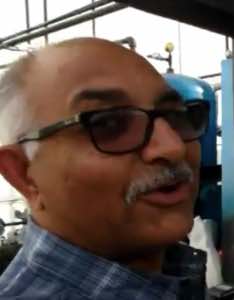 Brandon Yellowbird Stevens continues to play dumb – or just stay dumb – about the insidious origins, noxious nature, and indisputable facts surrounding the toxic, fraudulent ‘PYROLYSIS’ boondoggles proposed by ALLIANCE, OSGC, ACTI / American Combustion Technologies Inc. / aka American Renewable Technologies Inc. / ARTI / Abdul Latif Mahjoob, and OSGC’s partner Ron Van Den Heuvel.
Brandon Yellowbird Stevens continues to play dumb – or just stay dumb – about the insidious origins, noxious nature, and indisputable facts surrounding the toxic, fraudulent ‘PYROLYSIS’ boondoggles proposed by ALLIANCE, OSGC, ACTI / American Combustion Technologies Inc. / aka American Renewable Technologies Inc. / ARTI / Abdul Latif Mahjoob, and OSGC’s partner Ron Van Den Heuvel.
[SEE INFO BELOW & FULL TIMELINE]
Abdul Latif Mahjoob operates business under a variety of names, and each business takes credit for the same processes, equipment & operating facilities locations:
- Arian Engineering & Combustion Systems, Inc. / AECS
- American Combustion Technologies, Inc. / ACTI
- American Combustion Technologies of California, Inc. / also ACTI
- American Renewable Energy, Inc. / AREI
- American Renewable Technologies, Inc. / ARTI
- American Renewable Energy Corp. / AREC in Kansas City, MO; President, Director, Treasuer – Stuart Z. Hirschman; President – Eduart Z. Itiraclussas; Secretary – Irving M. Bush; Director – A. Latif Mahjoob
It is also unclear if ALL NATIONS ENERGY ALLIANCE, LLC was the same company that may have sold a ‘biomass pyrolysis machine’ near the Gila River Indian Reservation perhaps related to the project approved by the same 2012 U.S. Dept. of Energy Tribal Energy Program…
that also approved the ONWI Oneida Seven Generations Corporation’s ‘waste-to-energy’ & ‘plastics-to-oil’ fraud schemes…
which may have something to do with this item being found for sale on Green Bay Craigslist from Chandler, Arizona…
…next to the Gila River Indian Community:
• Complete Biomass / Green Waste / Recycling Plant
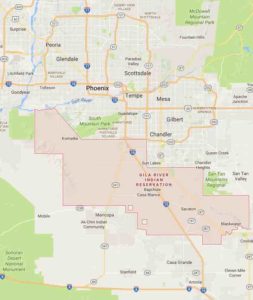
OSGC vs. EVERY GENERATION
- June 6, 2017 Judgment in a Civil Case, U.S. District Court for the Eastern District of Wisconsin, Case No. 16-cv-1700, [Oneida Nation of Wisconsin-owned] Oneida Seven Generations Corp. [OSGC] & [OSGC’s subsidiary] Green Bay Renewable Energy, LLC [GBRE] v. City of Green Bay
- June 6, 2017 Decision and Order Granting Motion to Dismiss, U.S. District Court for the Eastern District of Wisconsin, Case No. 16-CV-1700, [Oneida Nation of Wisconsin-owned] Oneida Seven Generations Corp. [OSGC] & [OSGC’s subsidiary] Green Bay Renewable Energy, LLC [GBRE] v. City of Green Bay
DECISION AND ORDER GRANTING MOTION TO DISMISS
Plaintiffs Oneida Seven Generations Corporation (OSGC) and Green Bay Renewable Energy, LLC, (GBRE) filed this action against the City of Green Bay pursuant to 42 U.S.C. § 1983 alleging the City violated their rights to substantive and procedural due process when the Common Council voted to revoke a conditional use permit it had granted only one year earlier. The case is before the Court on the City’s motion to dismiss for failure to state a claim pursuant to Rule 12(b)(6) of the Federal Rules for Civil Procedure. The City also contends that the complaint fails to allege facts showing GBRE has any interest or suffered any loss in the transaction and that OSGC lacks capacity to sue under the laws of the Oneida Nation [of Wisconsin] under which it was chartered. For these reasons, as well, the City argues that the claims against it should be dismissed.
In deciding a motion to dismiss, the court must accept as true all well-pleaded factual allegations of the complaint, drawing all reasonable inferences in favor of the pleading party. Moranski v. General Motors Corp., 433 F.3d 537, 539 (7th Cir. 2005). I therefore begin with a summary of those allegations.
ALLEGATIONS OF THE COMPLAINT
On March 1, 2011, Plaintiff Oneida Seven Generations Corporation (OSGC) obtained a conditional use permit (CUP) from the City of Green Bay, Wisconsin to build a facility to convert municipal solid waste into electricity and other useful products through a process known as pyrolysis. The facility, which was to be built on Hurlbut Street near the mouth of the Fox River, was designed to first sort and shred municipal solid waste, and then convey the waste to the pyrolysis unit, which would heat the waste to extremely high temperatures in an oxygen-starved environment. The process produces “syngas,” which is chemically similar to natural gas or methane. After being scrubbed, the syngas would then fuel three generators (large internal combustion engines) to produce electricity. Compl. ¶¶ 2–3.
[ CONTINUED BELOW THE NOTE ]
• NOTE :
OSGC’s & Artley Skenandore Jr.’s
called his own version of the
PULP & PLASTICS PYROLYSIS
Waste-to-Energy fraud scheme
GREEN BOX NA and GREEN BOX INT
under the umbrella-company
‘NATURE’S CHOICE TISSUE CORP.’
renamed E.A.R.T.H., then renamed
RECLAMATION TECHNOLOGY SYSTEMS LLC
which is currently under management
by Stephen A. Smith of
GlenArbor Partners Inc.
GlenArbor Investments / GlenArbor LLC.

…from the GREEN DETROIT REGIONAL CENTER’s EB-5 Immigrant Investors Program…
which advertises opportunities to ‘invest’ cash in U.S. companies in exchange for U.S. Visas from U.S. Citizenship & Immigration Services (USCIS), a component of the U.S. Dept. of Homeland Security (DHS):
 CLICK for an archive of www.GREENBOXNA.com
CLICK for an archive of www.GREENBOXNA.com
• May 20, 2015 Complaint in Brown Co. Case No. 15CV769, Dr. Marco Araujo, Cliffton Equities Inc., and Wisconsin Economic Development Corp. [WEDC] v. Green Box NA Green Bay LLC
• February 12, 2016 Van Den Heuvel’s Response to the State’s Reply to Motion for Return of Property, Brown Co. Case No. 2015CV1614, In the Matter of the Return of Property to Ronald Van Den Heuvel
• July 1, 2016 Paul Piikkila Plea Agreement, U.S. District Court, Eastern District of Wisconsin Criminal Case No. 16-CR-64, United States of America v. Paul J. Piikkila [former Interim Director of the Green Detroit Regional Center‘s EB-5 Immigrant Investor Program and Horicon Bank loan officer who has plead guilty to Conspiracy/Fraud schemes against Horicon Bank for the benefit of Ron Van Den Heuvel & his wife Kelly Van Den Heuvel]
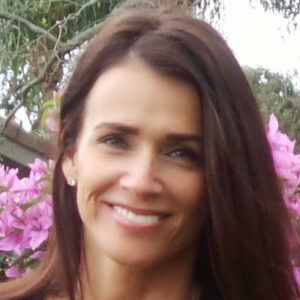 • September 20, 2016 Superseding Indictment [for a total of 19 Counts], U.S. District Court, WI Eastern District Docket No. 16-CR-064, United States of America v. Ronald H. Van Den Heuvel, Paul J. Piikkila, and Kelly Yessman Van Den Heuvel
• September 20, 2016 Superseding Indictment [for a total of 19 Counts], U.S. District Court, WI Eastern District Docket No. 16-CR-064, United States of America v. Ronald H. Van Den Heuvel, Paul J. Piikkila, and Kelly Yessman Van Den Heuvel
• January 23, 2017 Hearing re: Report & Recommendation,U.S. District Court, Eastern District of Wisconsin, Docket No. 16-CR-64, United States of America v. Ronald H. Van Den Heuvel, Paul Piikkila, and Kelly Y. Van Den Heuvel
1:45 pm [Asst. U.S. Attorney Matthew] Krueger informs the Court of separate ongoing federal investigations, government in possession of approximately 313,000 pages of material, potential relevance, and agrees the volume of material is not realistic for manual review.
06/28/17 UPDATE :
- June 28, 2017 Notice of a Hearing Scheduled for July 26, 2017, at 10:00 AM, in Room 149 of the U.S. Courthouse in Milwaukee, WI, U.S. Bankruptcy Court Case No. 16-24179, Green Box NA Green Bay, LLC
- June 23, 2017 Wisconsin Economic Development Corporation’s (WEDC) Objection to Debtor Green Box NA Green Bay LLC’s Motion to Modify Confirmed Third Revised Amended Chapter 11 Plan, U.S. Bankruptcy Court, Wisconsin Eastern District Docket No. 16-24179-beh, Chapter 11, Green Box NA Green Bay LLC
7. Debtor’s Motion offers no specific terms for the ‘contract’ which ‘has been entered into’ for ‘reacquisition’ …
8. The Debtor is currently delinquent filing one or more of its monthly operating reports…
9. Upon information and belief, the Debtor further misrepresented, whether intentionally or unintentionally, the nature and extent of all interested secured parties in the various personal property formerly or currently located at 821 Parkview Road… and WEDC has been substantially prejudiced as a result.
10. Debtor has not offered any proof of the alleged reports, studies, appraisals, accountings, returns, engagements, or contracts referenced in Paragraph 8 of its Motion.
11. Upon information and belief, the sums raised by the Debtor since the Order have not been paid by any third party interested in investment, but rather solely represent the continued cash contribution by the Debtor’s principal, Glen Arbor…
LATEST COURT FILINGS in U. S. District Court, Eastern District of Wisconsin, Docket No. 16-CR-64, United States of America v. Ronald H. Van Den Heuvel, Paul Piikkila, and Kelly Y. Van Den Heuvel re: CONSPIRACY TO COMMIT MULTIPLE COUNTS OF BANK FRAUD
From Exhibit A therein:
Debra Stary worked as [Ron] Van Den Heuvel’s secretary for 17-18 years. She was his right hand person, kept all the ledgers and was in charge of and maintained finances. She had no decision making authority.
Debra Stary was the
Vice President of
She didn’t want to
be on the Board but
[Ron] Van Den Heuvel
browbeat her until
she agreed.
[Paul] Piikkila didn’t know if Stary and Van Den Heuvel had a romantic relationship.
Van Den Heuvel was
intimidating and
Piikkila once saw
[Ron] punchThey had a fight because Van Den Heuvel approached [Ken Dardis] and asked him to invest $30,000. Bedford told him not to invest. Van Den Heuvel needed the money immediately for the Waste Fiber facility.
- According to the January 27, 2013, DECISION & ORDER of the Wisconsin Tax Appeals Commission, various dockets, Steven Peters, Ronald Van Den Heuvel and Artley Skenandore Jr. v. Wisconsin Dept. of Revenue, re: Oneida Seven Generations Corp. & Principals’ criminal fraud scheme:
Mr. Skenandore had no expertise in the paper industry. Nevertheless, he was made president [of Nature’s Way Tissue Corp.]
THE PRINCIPALS OF NATURE’S WAY TISSUE CORP.:
- ONEIDA SEVEN GENERATIONS CORP. – wholly-owned by the ONEIDA NATION of WI / ONWI and is currently suing the City of Green Bay in defense of its versions of Ron Van Den Heuvel’s criminal fraud schemes
 ARTLEY M. SKENANDORE JR. – currently the Principal of the Oneida Nation of Wisconsin High School and a ‘Faithkeeper’ of the Onayot aka Longhouse in Oneida, WI. According to the Brown Co., WI Sheriff’s Dept. website:
ARTLEY M. SKENANDORE JR. – currently the Principal of the Oneida Nation of Wisconsin High School and a ‘Faithkeeper’ of the Onayot aka Longhouse in Oneida, WI. According to the Brown Co., WI Sheriff’s Dept. website:
In 1957 with the election of Artley Skenandore [Sr.], Brown County [WI] became the first county to elect a full-blooded Indian to the position of sheriff.
Artley Skenandore Jr.’s wife is Oneida Police Department Lieutenant Lisa Drew Skenandore / Lisa Skenandore. The OPD is cross-deputized with the Brown County, WI Sheriff’s Dept. and with the Outagamie County, WI Sheriff’s Dept.
- RONALD H. VAN DEN HEUVEL – currently facing bank fraud charges with wife Kelly Yessman Van Den Heuvel and under investigation by no less than 5 federal agencies.
According to the Brown Co., WI Sheriff’s Dept. website, Ron’s grandfather – Henry Van Den Heuvel – served as Brown Co., WI Sheriff 1915–1916 and 1920-1921.
- STEVEN C. PETERS – admitted complicity for his role in Ron & Kelly Van Den Heuvel’s criminal bank fraud scheme
- June 19, 2017 Defendant Kelly Van Den Heuvel’s Motion to Sever Defendant (to sever her trial from the trial of her codefendant and husband Ron Van Den Heuvel)
- Exhibit F: March 14, 2008 Email from Paul Piikkila to John Jez regarding Source of Solutions, LLC $7.1 million financing request
- Exhibit H: April 15, 2015 FDIC Memorandum of Interview of Paul Piikkila at US Attorney’s Office, Eastern District of WI
[Paul J.] Pikkila presented the $7.1 million loan [proposal] to the [Horicon Bank] Loan Committee for approval. Piikila stated that [the] loan purpose was to purchase equipment for the paper mill. Piikkila said that the loan committee denied the loan because they did not like [Ron Van Den Heuvel]‘s character. Piikkila reviewed the loan presentation and his attention was brought to the section intended to list the other related loans (Attachment 2). The RVDH [LLC] loan previously discussed was not listed in this section. Pikkila could not explain why he hadn’t listed that loan.
Piikkila restructured the $7.1 million loan [request] several times and presented it to the loan committee. The loan was denied each time.
Pikkila denied multiple times that bank management told him not ot loan money to [Ron Van Den Heuvel] or his related businesses. He was presented an email from Schwab to Piikkila which stated that the bank was not interested in loaning to [Ron Van Den Heuvel] unless the loan was collateratlized by CDs (Attachment 3). Piikkila did not remember that email. Piikkila stated that he continued to loan to [Ron Van Den Heuvel] because he felt he “could handle” him.
William ‘Bill’ Bain and wife Cynthia Bain – sister of Nature’s Way Tissue Corp.’s Vice-President Debra Stary.
Piikkila stated that [Ron Van Den Heuvel] came to him and asked if he could approve a loan to William Bain [Bill Bain]. Bain is [Ron Van Den Heuvel]‘s former brother-in-law [and partner in Ron & Bill Investments LLP, and Vice-President of Vos Electric, Inc.] [Ron Van Den Heuvel] said that he would pledge collateral for the loan.
Piikkila claimed that he thought the loan proceeds would be a split between Bain and [Ron Van Den Heuvel]. Piikkila said that at the closing Bain said he was not going to make any payments to the loan. Piikila counseled him that he should not sign the loan if he did not understand that he was responsible. Bain then signed for the loan. When asked if he thought this was a red flag, Pikkila said he didn’t think so because Bain was an accomplished businessman and knew what signing for a loan entailed.
Piikkila stated that Kelly Van Den Heuvel, [Ron Van Den Heuvel]‘s wife, introduced Julie Gumban … to him for a loan. … Piikkila stated that it seemed as though [Julie] Gumban did not really understand what was going on because she didn’t speak English very well. He thought that Kelly Van Den Heuvel was pushing [Julie Gumban] into getting the loan. Piikkila approved the loan anyway. Piikkila thought that Gumban was investing in KYHKJG, [LLC] owned by Kelly Van Den Heuvel.
Piikkila stated that [Julie] Gumban had taken out previous loans and credit cards for the Van Den Heuvel[s]. Piikila was asked why he approved a loan for Gumban because she had a low credit score…, lots of credit card debt and the unsecured loan was half of her annual salary. Piikkila stated that he thought Gumban’s living expenses were low and therefore she would be able to repay the loan.
Pikkila then admitted that he knew that [Julie] Gumban’s loan would be used to pay down [Ron Van Den Heuvel]‘s other loans at Horicon [Bank]. Piikila stated that he approved this loan so [Ron Van Den Heuvel]‘s loans would stay off the watch list.
At this point in the interview Piikkila’s attorney’s asked for a break so they could speak to their client.
After the break,
Piikkila explained
why he thought doing business with [Ron Van Den Heuvel] would be beneficial to the bank. He said that [E.A.R.T.H. / Environmental Advanced Reclamation Technology HQ, LLC / renamed Reclamation Technology Systems, LLC / RTS] was the endgame and Piikkila had full faith that [Ron Van Den Heuvel] would be successful in this venture. After [E.A.R.T.H.] took off, [Ron Van Den Heuvel] would bring his deposits to Horicon [Bank] and this would be a big payoff. Piikkila stated that he did this for his reputation and would hopefully get an additional bonus. Piikkila had worked closely with [Ron Van Den Heuvel] while he was at Anchor Bank and spoke to him on a weekly basis. Piikkila reiterated that he did not know how [Ron Van Den Heuvel] knew that he was at Horicon Bank and did not seek him out for business. …Piikkila made a $250,000 loan to Source of Solutions [LLC]. The authorized signer was Debra Stary. [Ron Van Den Heuvel] made her a Vice President of the company so she could sign for the note to keep [Ron Van Den Heuvel]‘s name off the paperwork so [Horicon Bank] management would not notice it. Piikkila added that [Debra] Stary also typed up the lease agreements which were later disputed by the bank.
Piikkila’s attorney’s noted that [Debra] Stary’s signature looked very similar to the renewal signature for the $70,000 KYHKJG line of credit.
Piikkila worked for [Ron Van Den Heuvel] after he was fired from Horicon Bank. He provided some information on [Ron Van Den Heuvel] and potentially defrauded investors. …
Debra Stary and William Bain’s wife [Cynthia Bain] are sisters.
Debra Stary no longer works for [Ron Van Den Heuvel] and is now with NPS [Corp.]. She was very close to [Ron] Van Den Heuvel and would do anything he asked.
Pikkilla stated that her family
had an intervention
to get her to quit working for [Ron Van Den Heuvel].
[ CONTINUED FROM ABOVE – Judge William C. Griesbach’s June 6, 2017 Decision & Order, Case No. 16CV1700, OSGC & GBRE v. City of Green Bay ]
OSGC had applied for the CUP after it learned that the City was extremely interested in development of a waste-to-energy facility within the City limits of Green Bay. Representatives of OSGC met with staff of the City’s Economic Development and Planning Departments to select a site which OSGC later purchased. OSGC then submitted a lengthy application in which it described the project, addressed potential environmental impacts, and acknowledged the oversight and enforcement responsibility that the Wisconsin Department of Natural Resources (DNR) would exercise over its operations. City planning staff reviewed the information and issued a report to the City’s Plan Commission which recommended granting the application. After consideration of the staff report, a presentation by OSGC, and a public hearing on the matter, the Plan Commission unanimously recommended that the City approve the CUP conditioned upon the facility complying with all federal and state environmental regulations. The issue then went to the full Common Council which held a public hearing similar to the hearing held before the Plan Commission. Following the OSGC presentation and public comments, the Common Council voted ten-to-one to approve the permit. Id. ¶¶17–31.
After the City approved the application for the CUP, OSGC spent a significant amount of money to purchase equipment for the new facility and pursue the additional permits it needed from the DNR, the U. S. Department of Energy and other state and local government agencies. On July 14, 2011, the Safety and Buildings Division of the Wisconsin Department of Commerce conditionally approved OSGC’s plan, noting that the owner was “responsible for compliance with all code requirements.” On August 3, 2011, OSGC’s detailed site plans and building plans were approved by the City and a building permit was issued. In September 2011, the DNR issued permits and approvals for the facility under the State’s clean air and solid waste laws. The DNR issued a formal Environmental Analysis which concluded that approval of the facility was not a “major action” and would not have significant environmental effects. The U.S. Department of Energy likewise completed its Environmental Assessment and issued a “Finding of No Significant Impact.” With all the required approvals in hand, OSGC proceeded with preparatory construction work. Id. ¶¶ 32–40.
In the meantime, citizen opposition to the project had grown more active. At an April 10, 2012 meeting of the Common Council the opposition groups accused OSGC of lying to the City in applying for the CUP by claiming that the facility would have no smokestacks and would produce no emissions. Responding to political pressure, the Common Council voted to hold a public hearing regarding the CUP and to “continue further information.” Id. ¶ 44. The Council directed the Plan Commission to hold a public hearing to “determine if the information submitted and presented to the Plan Commission was adequate for it to make an informed decision whether or not to advance the Seven Generation Conditional Use Permit (CUP) that was recommended.” Id. ¶ 45.
The meeting before the Plan Commission was held on October 3, 2012. After hearing from all parties, including City Planning Director Rob Strong who was directly involved in reviewing the application, the Commission concluded there had been no misrepresentation. In a report to the Common Council, the Plan Commission stated:
Based on the information submitted and presented, the Plan Commission determines that the information provided to the Plan Commission was not misrepresented and that it was adequate for the Commission to make an informed decision, and recommends that the CUP stand as is. The Commission further determines that the information the Plan Commission received was adequate, and based upon information then available, that the Plan Commission did understand that there were emissions and venting as a part of the system, and therefore made sure that the Seven Generations Corporation would need to meet the requirements of the EPA and DOE, as well as meeting the requirements of the municipal code through a normal process of give and take.
Id. ¶ 51.
Despite the unequivocal report from the Plan Commission, a letter from OSGC counsel that any effort by the City to revoke the CUP would be met with a damages claim for millions of dollars, and the advice of the City Attorney that there was no legal basis for the City to revoke the CUP, the Common Council voted on October 16, 2012, to reject the conclusions of the Plan Committee and to rescind the CUP previously granted to OSGC by a vote of seven to five. Two weeks later the City Attorney sent a letter to OSGC stating that the Council had rescinded the CUP because OSGC had made “false statements and misrepresentations” to the City “relat[ing] to the public safety and health aspect of the Project and the Project’s impact upon the City’s environment”
and regarding
“emissions, chemicals, and hazardous materials,” The letter did not identify the particular statements that were false, however, nor did it explain the basis for the City’s determination that any statements were false. Id. ¶¶ 55–60.
{• SEE ONEIDA EYE’s NOTES BELOW}
On November 14, 2012, OSGC requested an administrative appeal pursuant to Section 68.10 of the Wisconsin Statutes, and requested a hearing under Section 68.11. The City concluded that the hearings already conducted substantially complied with Section 68.11, however, and summarily denied the appeal. OSGC then commenced an action for certiorari review of the City’s decision in the Circuit Court for Brown County, alleging that the City “had arbitrarily and capriciously rescinded the permit based on an implied, unwritten condition; had deprived OSGC of its vested right to develop the facility; had rescinded the permit without substantial evidence of misrepresentation; and had acted arbitrarily and unreasonably.” Id. ¶¶ 61–63.
OSGC’s petition for certiorari was denied by the Circuit Court for Brown County. OSGC appealed the court’s decision to the Wisconsin Court of Appeals, which reversed the Circuit Court’s decision in a twenty-page decision issued on March 25, 2014. Notwithstanding its stated reluctance to “interfere in such discretionary functions” as the decision to revoke a CUP, the Court of Appeals nevertheless concluded that the City’s decision could not stand. ECF No. 1-1, ¶¶ 20, 43. Characterizing the City’s action as “fickle and inconstant,” the Court concluded there was no basis for the City’s finding that OSGC had made any misrepresentations to the City. The Court emphasized that the City had not even mentioned the Plan Commission’s report or explained why it had not adopted it, since the Plan Commission was in a much better position to determine whether misrepresentations had been made. Given the City’s failure to identify the false statement allegedly made by OSGC or consider the Plan Commission’s report, the Court concluded:
we cannot help but believe the City’s decision was not based on a rational analysis of the statements [OSGC] made to the Plan Commission, but the public pressure brought to bear on the Common Council after the CUP had been issued
Id. ¶ 27. The City filed a petition for review of the Court of Appeals decision with the Wisconsin Supreme Court, which granted the petition but also concluded, with the Chief Justice dissenting, that the City’s action was not supported by substantial evidence and affirmed the decision of the Court of Appeals in a decision issued on May 20, 2015. ECF No. 1-2.
Although it ultimately prevailed in the state courts, OSGC never requested reissuance of the CUP. According to the complaint, “OSGC proposed the waste-to-energy project when it did because of the availability of federal, state, and local grants, tax deductions and other incentives.” Compl. ¶ 73. “Unfortunately,” the complaint alleges, “those opportunities have expired, such that the project is no longer economically viable.” (Id.) Instead, OSGC and GBRE, the wholly owned indirect subsidiary of OSGC which was formed for the purpose of developing the facility, filed this lawsuit pursuant to 42 U.S.C. § 1983, in an attempt to recover $5.2 million in out-of-pocket expenses OSCG incurred in developing the project, $16 million in profits they claim the facility would have generated, and the attorneys’ fees incurred in the state and federal court actions to vindicate their rights.
ANALYSIS
A. Threshold Issues
As an initial matter, the City argues that OSGC lacks the capacity to sue and that the complaint fails to allege any facts that show the GBRE has any claim against it. The City’s lack of capacity argument is based on OSGC’s status as a tribal corporation chartered under the laws of the Oneida Nation, a federally recognized Indian tribe. According to the OSGC Corporate Charter, the Charter was granted by the Oneida Business Committee under the authority vested in it by the Oneida General Tribal Council. Under the Oneida Constitution and By-Laws, the General Tribal Council is the governing body of the Oneida Nation and the Business Committee, consisting of nine elected members, and is empowered to perform such duties as may be authorized by the General Tribal Council.
The City contends that on December 15, 2013, the General Tribal Council voted to dissolve OSGC. Although the Business Committee has begun the process of dissolution, it has apparently not been completed. Nevertheless, the City argues, based upon amendments of OSGC’s corporate charter and the tabling of a motion that would have expressly authorized OSGC to continue its litigation against the City, that it lacks authority to bring this action. Although the same argument applies to GBRE, a wholly owned subsidiary of OSGC, the City argues that the complaint fails to allege that GBRE suffered any injury in fact that would give it standing to sue in any event. For these reasons, the City argues the action should be dismissed.
Neither argument warrants dismissal at this stage of the proceedings. The City’s argument that OSGC, and GBRE too, lack capacity to sue is predicated on facts outside the pleadings and the attachments thereto. The City has attempted to support its argument by submitting documents concerning internal tribal governance and affairs. OSGC challenges the City’s interpretation of the documents and none provide unequivocal support for the City’s position. For the court to fully consider whether OSGC and GBRE lacked capacity, it would have to convert the pending motion to dismiss to one seeking summary judgment and, even then, the answer may not be sufficiently clear to allow a ruling as a matter of law. I therefore decline to do so.
As for the City’s contention that the complaint fails to allege that GBRE suffered any injury in fact, I note that the complaint refers to OSGC and GBRE collectively as OSGC. Thus, any injury that OSGC suffered the complaint attributes to GBRE as well. More specifically, the complaint alleges that GBRE was formed for the purpose of developing the facility. Given this allegation, it is not unreasonable to infer that at least some of the development costs for and profits from the project would have been borne by and later received by GBRE. At least at this stage, this is sufficient to withstand a motion to dismiss.
B. Procedural Due Process
The complaint alleges that the City deprived the defendants of their right to procedural due process. The Fourteenth Amendment provides, as relevant here, “nor shall any State deprive person of life, liberty, or property, without due process of law.” U.S. Const. amend. XIV, § 1. To demonstrate a procedural due process violation of a property right, the plaintiff must establish that there is “(1) a cognizable property interest; (2) a deprivation of that property interest; and (3) a denial of due process.” Hudson v. City of Chicago, 374 F.3d 554, 559 (7th Cir. 2004) (citation omitted). It is with respect to the third element of its procedural due process claim that OSGC’s complaint fails.
To be sure, OSGC was entitled to due process. River Park, Inc. v. City of Highland Park, 23 F.3d 164, 166 (7th Cir. 1994). But this was essentially a zoning case, and “the procedures ‘due’ in zoning cases are minimal.” Id. (citing Eastlake v. Forest City Enters., Inc., 426 U.S. 668 (1976)). “Municipalities need not use adjudicative procedures to make zoning decisions.” Coniston Corp. v. Hoffman Estates, 844 F.2d 461, 467–68 (7th Cir.1988) (“The decision whether and what kind of land uses to permit does not have the form of a judicial decision.”). Here, there is no dispute that OSGC received notice and a hearing at which it was able to address the allegations that it had misrepresented certain features of the project prior to the initial vote granting its application for the CUP. But more importantly, the procedural protection afforded OSGC’s interest in the CUP did not end with the decision of the Common Council. OSGC sought judicial review in state court via writ of certiorari and ultimately succeeded in having the City’s decision rescinding its CUP overturned. “A person contending that state or local regulation of the use of land has gone overboard must repair to state court.” River Park, 23 F.3d at 167. This is because “when the claim depends on the due process clause, state litigation may supply that process.” Id. (citing Eastlake, 426 U.S. at 679 n.13).
That is precisely what occurred here. Whatever procedural protection OSGC believes it was denied by the City was supplied by the availability of judicial review in the state courts, which ultimately reversed the City’s decision to rescind the previously issued CUP. The fact that the project was no longer economically viable by the time the process was complete does not change the result. Leaving aside the question how a project OSGC claims would have generated $16 million in profit could have lost its economic viability in five years, OSGC successfully utilized the procedural safeguards that were available for restricting the City’s authority to impose zoning limitations on the use of its land. OSGC’s procedural due process claim therefore fails.
C. Substantive Due Process
The complaint also asserts a claim that the City deprived the defendants of substantive due process. “Substantive due process is admittedly an ‘amorphous’ concept.” Bettendorf v. St. Croix Cnty., 631 F.3d 421, 426 (7th Cir. 2011) (quoting Tun v. Whitticker, 398 F.3d 899, 900 (7th Cir. 2005)). “It is perhaps for this reason that its scope remains ‘very limited.’” Id. (citing Washington v. Glucksberg, 521 U.S. 702 (1997)). “A government entity must have exercised its power without reasonable justification in a manner that ‘shocks the conscience’ in order for a plaintiff to recover on substantive due process grounds.” Id. (quoting Rochin v. California, 342 U.S. 165 (1952)).
In CEnergy-Glenmore Wind Farm No. 1 v. Town of Glenmore, 769 F.3d 485 (7th Cir. 2014), a wind farm developer claimed that the Town Board had deprived it of substantive due process by delaying action on its application for building permits for the windmill structure so as to cause the developer to lose a lucrative contract for the sale of the power the farm would have generated. This court dismissed the claim pursuant to Federal Rule of Civil Procedure 12(b)(6), and the Seventh Circuit affirmed on the grounds that “the Board’s actions were not arbitrary in the constitutional sense and because CEnergy did not seek recourse under state law as required by a long line of cases in this circuit.” Id. at 488. On the issue of arbitrariness, the Court noted that “a land-use decision must ‘shock the conscience’ to run afoul of the Constitution.” Id. (citing Bettendorf, 631 F.3d at 426). The Court also noted that it had “suggested that the action must have been ‘arbitrary and capricious’ or ‘random and irrational.’” Id. (internal citations omitted). In yet another formulation, the Court noted that “the Supreme Court has explained that a land-use decision must be arbitrary to the point of being ‘egregious’ to implicate substantive due process.” Id. (citing City of Cuyahoga Falls v. Buckeye Cmty. Hope Foundation, 538 U.S. 188, 198 (2003)). Applying the standard to the facts alleged in CEnergy’s complaint in that case, the Court held that “the Glenmore Town Board’s decision to delay action on CEnergy’s building permit requests could not have been arbitrary in the constitutional sense.” Id. “As far as the Constitution is concerned,” the Court observed, “popular opposition to a proposed land development plan is a rational and legitimate reason for a legislature to delay making a decision. See River Park, 23 F.3d at 167 (explaining that ‘the idea in zoning cases is that the due process clause permits municipalities to use political methods to decide’).”
Likewise in this case, the City Council’s decision to rescind the CUP was in response to popular opposition which developed after the permit was issued. The Council determined that OSGC had made several misrepresentations about the project in the course of the public hearings on its application for the CUP. According to the decision of the Wisconsin Supreme Court attached to the complaint, the Council specifically focused on statements made by representatives of OSGC concerning emissions from the proposed facility, smoke stacks and the successful utilization of the same technology in other parts of the country. 2015 WI 50, ¶ 53. The majority opinion carefully analyzed the evidence bearing on the oral representations made by OSGC’s CEO, engineer, and project manager at the public hearing. Id. at ¶¶ 54–79. Based upon its review, the Court concluded that “the City’s decision to rescind the conditional use permit was not based on substantial evidence.” Id. at ¶ 81. The Court explained: “In conducting a certiorari review to determine whether there was substantial evidence to support a decision, we consider the evidence in context. Considering the context, we determine that based on the evidence presented, the City could not reasonably conclude that the statements by Oneida Seven’s representative to the City government regarding the proposed facility’s emissions and hazardous materials, its stacks, and its technology were misrepresentations.” Id. Chief Justice Roggensack filed a dissenting opinion in which she argued that the majority had failed to accord the City Council’s finding that OSGC had made misleading statements. She noted that the Common Council was not making a claim for actionable misrepresentation, but instead relied on the misleading statements as an equitable basis for rescinding the CUP. Id. at ¶¶ 82–84, 99 (Roggensack, C.J., dissenting).
Even though the Wisconsin Supreme Court ultimately concluded that the Council’s decision was not based on substantial evidence and could not stand, this does not mean it was arbitrary in a constitutional sense. Something more than a favorable state court ruling is needed in order for a municipal board’s decision on a zoning issue to be found to violate a property owner’s right to substantive due process. See Harding v. County of Door, 870 F.2d 430, 432 (7th Cir. 1989) (“Although the Wisconsin Court of Appeals ultimately determined that the Board’s interpretation of the zoning ordinance was erroneous, this fact does not transform the Board’s rational decision into an irrational one.”). It is noteworthy that both the trial court and the Chief Justice found sufficient evidence to support the action taken by the City. Also of note is the fact that OSGC did not seek an award of actual attorneys’ fees and costs pursuant to Section 895.044 of the Wisconsin Statutes on the grounds that the City’s defense was asserted in bad faith or with intent to harass or injure, or that the City or its attorneys knew or should have known that its position was without any reasonable basis in law or equity.
In Eichenlaub v. Township of Indiana, town officials were alleged to have applied subdivision requirements to the plaintiffs’ property that were not applied to other parcels, pursued unannounced and unnecessary inspection and enforcement actions, delayed certain permits and approvals, improperly increased tax assessments, and maligned and muzzled the plaintiffs. 385F.3d 274, 286 (3d Cir. 2004). Noting that the complaints were typical of the kind of disagreement that is frequent in planning disputes and that there was no allegation of corruption or self-dealing, the court affirmed the district court’s conclusion that the “misconduct alleged here does not rise sufficiently above that at issue in a normal zoning dispute to pass the ‘shocks the conscience test.’” Id.
Similarly in this case, there was no allegation of corruption or self-dealing by Council members who voted in favor of rescinding the CUP. The allegations of misrepresentation were based on the arguably misleading oral statements that OSGC’s representatives made, but which a majority of the Wisconsin Supreme Court concluded, in context and considering the written statements and more direct involvement with the Plan Committee, did not amount to intentional misrepresentation of a kind that justified rescinding the CUP. That the analysis of a majority of the Council members failed to consider the entire context when confronted with angry constituents is hardly shocking.
Finally, the fact that OSGC ultimately prevailed and could have completed the project had it chosen to do so also makes the City Council’s decision less shocking or egregious than a substantive due process violation requires. There is no suggestion that the City Council members were aware that delay would essentially kill the project because it would lose whatever economic viability it might have had. In the final analysis, the City’s action caused a delay in the project; it was apparently a change in other factors over which the City had no control that caused OSGC to abandon it.
CONCLUSION
For the reasons set forth above, the City’s motion to dismiss pursuant to Rule 12(b)(6) for failure to state a claim is granted. The Clerk is directed to enter judgment accordingly.
SO ORDERED at Green Bay, Wisconsin this 6th day of June, 2017.
William C. Griesbach, Chief Judge United States District Court
• NOTE: On November 8, 2000, the Oneida Business Committee unanimously adopted OBC Resolution 11-08-00-B, ‘Dioxin & Persistent Organic Pollutants’
WHEREAS, the ability of our Native community to be protected from the effects of dioxin poisoning is critical to the future of our tribal nations and all life that sustains us, and…
WHEREAS, tribal communities and families continue to be disproportionately exposed to dioxin and other persistent organic pollutants. Many of our tribal members are more susceptible to these dangerous toxins due to land-based culture and subsistence practices, and…
WHEREAS, dioxin has been classified as a “known human carcinogen” with the “highest” level of certainty by the International Agency for Research on Cancer, and acknowledged by the World Health Organization that dioxin exposure is linked to severe health effects…
NOW, THERE, BE IT RESOLVED: that the Oneida Tribe of Indians of Wisconsin requests that the United States State Department pursue ending the production and release of Dioxin and other Persistent Organic Pollutants in the United States

![]() According to the March 7, 2011 GreenAction for Health & Environmental Justice’s Evaluation of the Oneida Seven Generations Corporation Proposal for a Pyrolysis Gasification facility at the Oneida Nation of Wisconsin:
According to the March 7, 2011 GreenAction for Health & Environmental Justice’s Evaluation of the Oneida Seven Generations Corporation Proposal for a Pyrolysis Gasification facility at the Oneida Nation of Wisconsin:
…Emissions Source tests conducted at the Romoland [California] facility in June-July 2005 confirmed that this technology emits dioxin and other toxic air contaminants as well as other pollutants. [The] preliminary evaluation of the test results found some emissions exceeded those from typical garbage incinerators. …
We respectfully urge the Oneida Nation to reconsider this project that would pollute the environment and undermine true renewable energy efforts, and instead pursue safer, truly green and viable economic development projects.
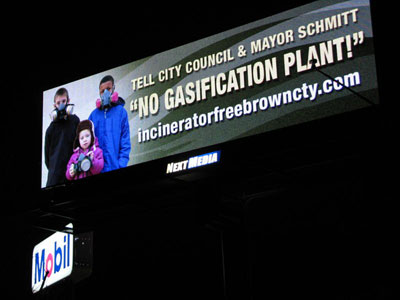
- March 16, 2012 Letter from Mather Heights Neighborhood Association, Clean Water Action Council of Northeast Wisconsin, and Incinerator Free Brown County to Green Bay Mayor Jim Schmitt and City Council Members re: Request for action on Oneida Seven Generation Corporation’s Conditional Use Permit
- March 17, 2012 Letter from Clean Water Action Council of Northeast Wisconsin President Dean Hoegger to Oneida Business Committee Chair Ed Delgado, OBC Vice-Chair Greg Matson, OBC and Oneida Nation of Wisconsin re: Petition signed by 1,100 area residents in opposition to OSGC’s Waste Gasification Incinerator
 On April 11, 2013 the Oneida Business Committee held an EMERGENCY OBC MEETING…
On April 11, 2013 the Oneida Business Committee held an EMERGENCY OBC MEETING…
re: Fmr. OBC Chair Ed Delgado’s call for OBC to acknowledge and address the blatant contradictions pointed out to him by GTC Petitioner Leah Sue Dodge between…
and the OBC’s Resolutions in support of OSGC’s DIOXIN-emitting waste incinerator project…
whether built on or off the Oneida Reservation…
but the corrupt OBC voted UNANIMOUSLY to REAFFIRM their support for OSGC’s experimental DIOXIN-emitting waste incinerator schemes which OSGC & GBRE were marketing to tribes & municipalities throughout the United States…
after consultation & guidance from
Carl J. Artman’s first cousin…
ONEIDA LAW OFFICE CHIEF COUNSEL
JO ANNE HOUSE
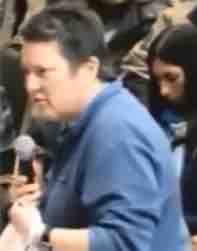
A. Executive Session
1. Rescind resolution 12-08-10-B, ‘Supporting Oneida Seven Generations and Oneida Energy in the Development of the Waste-to-Energy Project’
Sponsored by: [Fmr. OBC Chair] Ed Delgado
 Motion by [then-OBC Treas.] Tina Danforth to reaffirm resolution 12-08-10-B, ‘Supporting Oneida Seven Generations and Oneida Energy in the Development of the Waste-to-Energy Project,’ seconded by Paul Ninham.
Motion by [then-OBC Treas.] Tina Danforth to reaffirm resolution 12-08-10-B, ‘Supporting Oneida Seven Generations and Oneida Energy in the Development of the Waste-to-Energy Project,’ seconded by Paul Ninham.
Motion carried unanimously:
Ayes: Melinda J. Danforth, Tina Danforth, Vince DelaRosa, Greg Matson, Patty Hoeft, David Jordan, Paul Ninham
Not present: Brandon Stevens
04/12/13 Green Bay Press-Gazette: Oneida Business Committee reaffirms alt-energy support; Board still stands behind Green Bay gasification plant by Scott Cooper Williams
ONEIDA – [The Oneida Nation of Wisconsin’s Business Committee] are standing behind a tribal company’s controversial efforts to build a waste-to-energy plant in Green Bay.
But members of the…Oneida Business Committee [OBC, subordinate to the General Tribal Council / GTC], are not divulging whether they also support continuing a court fight over the project.
Representatives of the Oneida Seven Generations Corp. met with tribal leaders Thursday for more than an hour, amid growing signs that the company is losing support among its own people.
[OBC] Chairperson Ed Delgado, in particular, has voiced concerns about the waste-to-energy initiative and, with regard to the lawsuit, has said he wants to “stop the spending.”
After Thursday’s closed-door meeting with company officials, however, Delgado joined other tribal leaders in a public show of solidarity with Oneida Seven Generations Corp.
Delgado and other [OBC] members declined to comment.
Before the vote, Oneida Seven Generations [Corp.] board member Paul Linzmeyer told reporters he was unsure if the company still had tribal leaders’ support in pursuing the Green Bay development.
“All we’re trying to do,” be said of the meeting, “is work through a lot of different issues together.”
The [OBC] voted unanimously to reaffirm its support of a resolution backing the Green Bay project. The resolution states that the proposed facility would not use “any type of incineration or burning” and “will not have smokestacks.”
[The OBC & OSGC claim that] the gasification plant would process tons of household trash at high temperatures in a way that leaves only charred waste, easing the need for landfill dumping while also creating a new source of electrical energy.
Green Bay city officials withdrew a permit for the project at 1230 Hurlbut St. after determining that Oneida Seven Generations [Corp.] had misled the city about emissions and other aspects of the facility.
After a judge ruled in the city’s favor in a resulting lawsuit, the development firm announced its plans to appeal.
Delgado moved to reconsider the company’s legal fees Thursday, but the [OBC] would not discolse its decision on the issue.
While waging the court fight, Oneida Seven Generations [Corp.] also has sought to locate a similar gasification plant on tribal land west of Green Bay.
Tribal members opposed to the project have circulated a petition for a General Tribal Council [Meeting] on the issue.
That gathering is scheduled for May 5 [2013].
Leah Dodge, a leader of the petition drive, said Thursday’s action by the Oneida Business Committee signals the importance of a [GTC Meeting] that stops the gasification concept from going forward.
“Now the General Tribal Council will have to step up to do the job to protect the Oneida Tribe which the Business Committee abdicated,” Dodge said.
_________
• NOTE: GTC can actually craft, adopt, change, and enforce Tribal Directives & Laws during GTC Meetings, so they are much more than just a “referendum.”
• Gasification IS Incineration / Trash-to-Ash / Landfill-To-Skyfill-To-Lungfill
• OBC Resolution 12-08-10-B actually states that the OBC supports OSGC & subsidiary Oneida Energy Inc. …
…as corporations wholly owned by the Tribe constructing this facility on the Oneida Reservation, OSGC and Oneida Energy are bound to comply with tribal land use and environmental laws as well as federal environmental laws
The 1230 Hurlbut St. parcel is located in the City of Green Bay and is NOT “on the Oneida Reservation.”
There was no mention nor disclosure to GTC of the existence nor true ownership of OSGC’s indirect-subsidiary Green Bay Renewable Energy, LLC – a Delaware corporation staffed with OSGC’s executives & officers – until after the lawsuit against the City of Green Bay began with GBRE as OSGC’s Co-Plaintiff.
- 04/12/13 report on WTAQ: Oneida tribal committee back gasification plant
ONEIDA, WI – Members of the Oneida Nation’s Business Committee voted Thursday to continue supporting efforts to build a waste-to-energy facility.
Resolution 12-08-10-B lays out backing of a project to build a gasification facility which aims, “to generate about 4 to 10 megawatts of electricity for 3,000 to 5,000 residential homes to be sold to Wisconsin Public Service.”
What the resolution doesn’t say is specifically where this plant will be constructed.
Tribal Council Chair Ed Delgado proposed rescinding the resolution of support, but a majority of members voted against the action.
The resolution says, “the Oneida Business Committee enthusiastically supports this project and will work with OSGC and Oneida Energy to help them realize the opportunity and to locate the facility on a site that is most desireable.”
The Green Bay City Council revoked a conditional use permit for Oneida Seven Generations Corporation back in October for the plant on Hurlbut Street. The council felt OSGC lied about the nature of the project with regards to the existence of smokestacks and emissions.
OSGC filed a lawsuit, but a Brown County judge ruled in favor of the city and its reasons for pulling the permit.
Initial reports indicated that support among members of the Oneida Business Committee was dwindling.
OSGC says it will appeal and has moved forward with a lawsuit seeking damages of more than $4 million.
06/06/17 DISMISSAL
of OSGC / GBRE LAWSUIT against
the CITY of GREEN BAY:
In the 13-page ruling, Judge William Griesbach said that because after the OSGC won a ruling in state court reversing the Council’s decision – but did not pursue the plant any further – the decision not to build belongs to the tribe, not the city.
“The fact that OSGC ultimately prevailed and could have completed the project had it chosen to do so also makes the City Council’s decision less shocking or egregious than a substantive due process violation requires. There is no suggestion that the City Council members were aware that delay would essentially kill the project because it would lose whatever economic viability it might have had. In the final analysis, the City’s action caused a delay in the project; it was apparently a change in other factors over which the City had no control that caused OSGC to abandon it,” the judge wrote.
In a statement, Mayor Jim Schmitt said, “We just learned the Federal Court dismissed the complaint filed by Oneida Seven Generations Corporation. The suit against the City of Green Bay was based on the revocation of a conditional use permit for their intended waste-to-energy facility. This is great news for City tax payers, as OSGC sought millions in damages from the City. The decision issued by Judge William C. Griesbach states that even though the City should not have revoked the permit, due process was adequately given. We respect the ruling by the federal court, and hope to move forward with mutual respect and relationships with the Oneida Nation.”
The Oneida Nation has not responded to Fox 11’s request for comment.
- Green Bay Press-Gazette: Federal judge rejects Oneida Seven Generations Corp. lawsuit against City of Green Bay
GREEN BAY – A federal judge has dismissed a $21 million lawsuit against the city of Green Bay over its revocation of a permit for a waste-to-energy plant.
Oneida Seven Generations, a company created by the Oneida Tribe of Indians [now known as the Oneida Nation of Wisconsin] for economic development, filed the lawsuit in December alleging the City Council’s reversal on the permit in 2012 was illegal and had cost the company $5.2 million it had invested in the project and about $16 million in lost profit.
The city initially approved construction of a biomass-processing plant on Hurlbut Avenue, but the Council rescinded the permit after a group of residents and some aldermen claimed the company had misrepresented the threat of pollution from the plant’s emissions.
Oneida Seven Generations sued in Brown County Circuit Court. The case was settled in 2015 by a state Supreme Court ruling that the city had acted improperly in revoking the permit.
That lawsuit did not seek financial damages.
However, the company claimed in the subsequent federal lawsuit that the plant could no longer be built because grants that were needed to make the project financially viable were no longer available, resulting in a $21 million loss.
The lawsuit called the city’s decision to revoke the permit “a reckless, arbitrary and irrational act resulting from abuse of political power and a disdain for established procedure.”
U.S. District Court Judge William Griesbach on Tuesday rejected the company’s claim, finding that the city’s decision, while overruled by the Supreme Court, affected only the timing of the project.
“In the final analysis, the City’s action caused a delay in the project; it was apparently a change in other factors over which the City had no control that caused OSGC to abandon it,” Greisbach wrote.
Green Bay’s Common Council initially approved the OSGC permit in 2011. The Department of Natural Resources and Department of Energy also gave approval.
However, citizen opposition to the plant and its smoke stacks grew, and the Common Council accused OSCG of making misrepresentations about the plant. The council decided to rescind the permit.
OSGC filed suit trying to recover $5.2 million in expenses for development of the plant, and $16 million in potential lost profits.
The case eventually landed in the Wisconsin Supreme Court, which affirmed the decision of a lower court in favor of the OSGC.
However, the OSGC never requested a new conditional use permit. That was part of the federal judge’s decision to dismiss the case.
“The fact that OSGC ultimately prevailed and could have completed the project had it chosen to do so also makes the City Council’s decision less shocking or egregious than a substantive due process violation requires,” Judge Griesbach wrote.
- Wisconsin Public Radio: Wisconsin Tribe Loses A Court Fight Against The City Of Green Bay
In his ruling, [Judge] Griesbach said since the corporation had won an earlier case in the matter and had chosen not to pursue the energy project it is not entitled to damages.
Previously on Oneida Eye:
